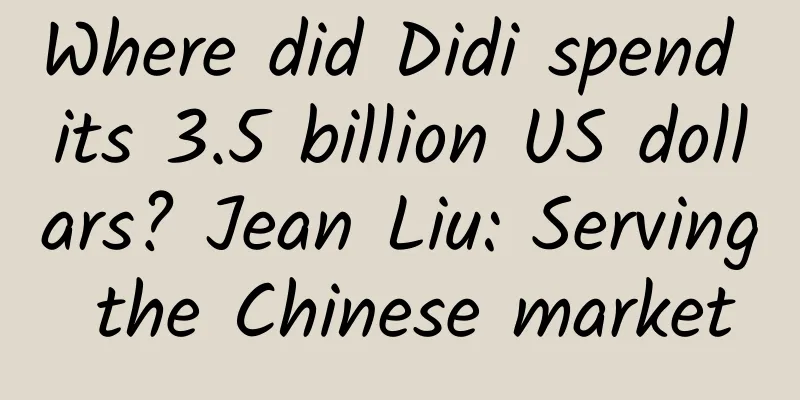Where did Didi spend its 3.5 billion US dollars? Jean Liu: Serving the Chinese market

|
On July 8, Didi Kuaidi announced that it had completed a $2 billion financing. However, there are still several hundred million dollars of remaining funds in this round of financing, and the financing will exceed $2 billion after all is completed. Didi Kuaidi will have a cash reserve of more than $3.5 billion. Didi Kuaidi's president Jean Liu told Tencent Technology that the $3.5 billion will be mainly used to serve the Chinese market. The Chinese market still has huge demand, and a large amount of money will be invested in the accumulation of customers, big data and technology improvement. In addition, there is also a lot of imagination in mergers and acquisitions. Liu Qing said that Didi Kuaidi will soon enter the stage of building and maintaining the ecosystem. In addition to cooperation with finance and insurance, the automotive aftermarket will also be a key area of focus, not only becoming the entrance to O2O services, but also involving the sale and rental of complete vehicles, etc. These will be mainly achieved through investment layout. In addition, Didi Kuaidi has also begun its overseas expansion. An investor close to Didi Kuaidi revealed to Tencent Technology that Didi Kuaidi’s investment in Southeast Asian taxi app GrabTaxi is true, and this is just the beginning. Alibaba and Tencent both increased their holdings Didi Kuaidi President Jean Liu said that this round of financing started on June 22 and took only two weeks. The initial financing amount was US$1.5 billion, which was oversubscribed in 5 days and later increased to US$2 billion. However, there are still hundreds of millions of dollars left in this round of financing, and new investors will join in the next month. It is expected that after the completion of this round of financing, the financing amount will far exceed US$2 billion. It is understood that new investors include Capital International Private Equity Fund, Ping An Innovation Investment Fund, etc., and existing shareholders such as Alibaba , Tencent, Temasek, and Gaodu Capital have also made additional investments. As for whether the Chinese sovereign fund among the existing shareholders has increased its holdings, Didi Kuaidi said it is not convenient to invest for the time being. In May this year, Sina Weibo submitted documents to the US Securities and Exchange Commission showing that it invested $142 million in Didi Kuaidi's last round of financing. At that time, Didi Kuaidi was valued at $8 billion. After this round of financing, some investment institutions expect Didi Kuaidi's valuation to further increase to $15 billion. According to the strategic director of Didi Kuaidi, investors' enthusiasm for Didi Kuaidi is mainly due to its prospects and the huge returns it can bring. This timing and financing amount will bring the greatest return to shareholders and is also the best time for Didi Kuaidi to make its layout. Cheng Wei revealed in a previous shareholder letter that since May, Didi Kuaidi's daily private car orders have increased from 1 million to 3 million, a 30% increase per week. It currently has an 80% share of the Chinese private car market. The number of taxi trips has reached 3 million, accounting for 99% of China's taxi hailing market. One month after the launch of Hitch, it has now covered more than 148 cities across the country, with a daily peak order volume of 600,000. The highest peak of the total daily orders on the entire platform is approaching the 10 million mark. But when talking about Didi's IPO, Liu Qing said there is no clear timetable yet. An investor close to Didi Kuaidi once told Tencent Technology that Didi Kuaidi's goal is to compete with Uber for the first IPO of the travel industry. Although Didi Kuaidi's valuation has doubled after this round of financing, the top management and investors behind it are not satisfied with the current valuation. Didi Kuaidi's user base and order volume far exceed Uber, but its valuation is much lower than Uber, so this may not be the last round of financing before Didi Kuaidi's IPO. Where will the 3.5 billion US dollars be used? Liu Qing said that after the completion of this round of financing, Didi Kuaidi will have a cash reserve of more than 3.5 billion US dollars, becoming the company with the highest cash reserves in China's mobile Internet field. Previously, there were rumors in the market that Didi was going to acquire Shenzhou Zhuanche as a whole and invest in Southeast Asian taxi app GrabTaxi. An investor close to Didi Kuaidi revealed to Tencent Technology that Didi Kuaidi's investment in GrabTaxi, a Southeast Asian taxi-hailing app, is indeed true, and it is just the beginning. A considerable portion of Didi Kuaidi's current round of financing will be used for global expansion and investment or acquisition of travel tools in other regions. Didi Kuaidi wants to compete with Uber for the first global travel IPO, so it must expand outward and tell a good global story. At today's media conference, Liu Qing told Tencent Technology that in addition to its global layout, Didi Kuaidi is more focused on the Chinese market, and the US$3.5 billion in cash will be mainly used to serve the Chinese market, including accumulating customers, and investing a lot of money in the research and development of big data and technology to consolidate the company's existing market leadership and further expand and deepen the domestic market and new businesses. Regarding investment and mergers and acquisitions, Liu Qing said that although Didi Kuaidi is still building a platform, it will soon enter the stage of building and maintaining an ecosystem, so the mentality will be very open in terms of investment and cooperation. The ecological layout may be mainly based on investment, and is not inclined to the overall merger and acquisition method. There is no discussion of mergers and acquisitions at present. In her opinion, Didi Kuaidi will become the Taobao and Tmall of the travel industry in the future, a high-frequency platform that meets multiple needs. It hopes to develop services based on the needs of users after going out, such as insurance for drivers and passengers, guaranteeing the condition of the car, car loans, and the automotive aftermarket. However, many services will not be provided by Didi itself, but will be developed through investment and other means. "The automotive aftermarket will be a key area of focus. Didi will not only become the entrance to many O2O services, but may also be involved in the sale and rental of complete vehicles. As for the P2P car rental field, it is also possible to participate through investment cooperation." Liu Qing said that Didi will be committed to building a comprehensive transportation ecosystem, and will look for greater space in areas such as logistics, insurance and finance, as well as automotive services, as well as map technology and location services. Not afraid of a subsidy war with Uber While Didi was announcing good news, Uber was also equally crazy about financing. Earlier, foreign media reported that Uber recently obtained a $2 billion credit line, which will come from large investment banks such as Morgan Stanley, Deutsche Bank and Goldman Sachs, while Uber's initial goal was a $1 billion credit line. After the financing is completed, Uber, which has not yet gone public, will raise more than $10 billion and its valuation may reach $50 billion. Uber founder Travis Kalanick once said that Uber plans to invest $1 billion in the Chinese market in 2015 and expand to another 50 Chinese cities within the next year. In addition, Uber will launch a new round of financing in China with an amount of $1.5 billion. The funds will be used in the Chinese market, for subsidies, to expand users, and to set up a separate entity for Chinese business. Facing the aggressive attack from Uber, Liu Qing said that Didi Kuaidi is based in the Chinese market, and the diversified travel service platform is the biggest difference between Didi Kuaidi and other competitors. China's demand is very diversified and very flexible. Taxi, private car, ride-sharing and other businesses can divert traffic to each other and share driver resources. This is Didi Kuaidi's competitive advantage. Didi started three years earlier and has accumulated three years of big data. Compared with Uber, its algorithm also understands the needs of Chinese people better. As for the subsidies, Liu Qing stated that Didi Kuaidi is not afraid of the subsidy war, and it knows better than its competitors how to avoid fake orders when subsidies are burning money. However, she believes that compared with subsidies, Didi Kuaidi will pay more attention to the scale effect generated by the market size. When the scale reaches a certain level, the needs of users and drivers can be met, and subsidies are not needed. At present, Didi is more willing to use subsidies to expand new users and passengers. Compared with the last round of money-burning war between Didi and Kuaidi, this time, competitors, Didi and Uber, have abandoned the previous method of subsidizing each order in subsidy design, and instead designed more complex rules to encourage more orders and services. Industry insiders told Tencent Technology that another trend in this round of money-burning war is that the main battlefield will be more inclined to cities other than Beijing, Shanghai, Guangzhou and Shenzhen. The potential users in first-tier cities have been developed almost completely, and it is difficult to see a big explosion in the short term, while areas other than Beijing, Shanghai, Guangzhou and Shenzhen have huge potential. As a winner of Toutiao's Qingyun Plan and Baijiahao's Bai+ Plan, the 2019 Baidu Digital Author of the Year, the Baijiahao's Most Popular Author in the Technology Field, the 2019 Sogou Technology and Culture Author, and the 2021 Baijiahao Quarterly Influential Creator, he has won many awards, including the 2013 Sohu Best Industry Media Person, the 2015 China New Media Entrepreneurship Competition Beijing Third Place, the 2015 Guangmang Experience Award, the 2015 China New Media Entrepreneurship Competition Finals Third Place, and the 2018 Baidu Dynamic Annual Powerful Celebrity. |
<<: 12 Industry Trends of “Internet+”
>>: Strange phenomenon in China's service robot market: industry is hot but investment is cold
Recommend
The universe is so vast that we cannot imagine it, but how small would it be if it were compressed to the density of a neutron star?
This article is based on answering similar questi...
Analysis of the operation matrix of Kaochong Postgraduate Entrance Examination
Excellent case analysis Case name: [Kaochong Kaoy...
Hail + rain + strong wind! The heaviest rainfall period is coming, pay attention to these places!
In mid-May, the southern region will enter a rain...
Why are the hottest days during the "dog days" instead of the summer solstice?
We are lucky to live on the paradise of life - th...
Beijing's first batch of websites and apps are accelerating their adaptation to the elderly: Meituan, Didi and others have undergone a "facelift"
IT Home reported on June 30 that according to Bei...
Wall Street lowers Tesla stock price forecast: too much growth will eventually pay off
Elon Musk just announced that Model 3 will be put...
Kuaishou Live Streaming Getting Started Guide
We often say that traffic is money, so how do we ...
How to modify SEO when a new website is launched? How to perform SEO optimization?
Due to inadequate early planning of location cons...
Why do you start reviewing a fight you didn't win during the day as soon as you take a shower?
Review expert: Yin Tielun, deputy chief physician...
The "Jiuxiao Huanpei" Qin collected by the National Museum of China (Part 1)
The "Jiuxiao Huanpei" Qin collected by ...
What is LSD? It once made Steve Jobs addicted
Lysergic acid diethylamide, also known as "l...
The bathroom is so small, why is the WiFi signal always so bad?
The bathroom is so small, why is the WiFi signal ...
PS4 version of "Tomb Raider Rise" review: How does the reborn Lara survive in the wilderness again
Speaking of "Tomb Raider", there are pr...
Task-based navigation design
[[154824]] There are many articles that introduce...
Here, there is a colorful "palette" that has not faded for hundreds of millions of years.
The picture shows the colorful "palette"...









